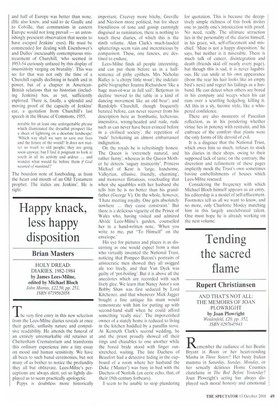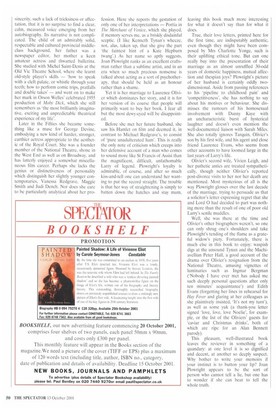Tending the sacred flame
Rupert Christiansen
AND THAT'S NOT ALL: THE MEMOIRS OF JOAN PLO WRIGHT by Joan Plowright Weidenfeid, £20, pp. 35Z ISBN 0297645943 Remember the radiance of her Beatie Bryant in Roots or her heart-rending Masha in Three Sisters? Her busty Italian mamma in Saturday, Sunday, lionday, or her sexually delirious Home Counties chatelaine in The Bed Before Yesterday? Joan Plowright's acting has always displayed such moral honesty and emotional
sincerity, such a lack of tricksiness or affectation, that it is no surprise to find a clear, calm, measured voice emerging from her autobiography. Its narrative is not complicated. The child of an admirably solid, respectable and cultured provincial middleclass background, her father was a newspaper editor, her mother a keen amateur actress and thwarted ballerina. She studied with Michel Saint-Denis at the Old Vic Theatre School, where she learnt old-style player's skills 'how to speak with a cleft palate, or whistle through your teeth; how to perform comic trips, pratfalls and double takes' — and went on to make her mark in Orson Welles' celebrated 1955 production of Moby Dick, which she still remembers as the most brilliantly imaginative, exciting and unpredictable theatrical experience of my life'.
Later in the Fifties she became something like a muse for George Devine, embodying a new kind of harder, stronger, earthier actress appropriate to the aesthetic of the Royal Court. She was a founder member of the National Theatre, shone in the West End as well as on Broadway, and has latterly enjoyed a somewhat miscellaneous film career. Perhaps she lacks the genius or distinctiveness of personality which distinguish her slightly younger contemporaries, Vanessa Redgrave, Maggie Smith and Judi Dench. Nor does she care to be particularly analytical about her pro
fession. Here she reports the gestation of only one of her interpretations — Portia in The Merchant of Venice, which she played, if memory serves me, as a briskly disdainful sceptic. (I like Kenneth Tynan's wheeze, not, alas, taken up, that she give the part the faintest hint of a Kate Hepburn twang'.) As her name so aptly suggests, Joan Plowright ranks as an excellent craftsman rather than a sublime artist, and in an era when so much precious nonsense is talked about acting as a sort of psychotherapy, that should be held as an honour rather than a shame.
Yet it is her marriage to Laurence Olivier which dominates her story, and it is for her version of its course that people will primarily want to buy her book. I fear all but the most dewy-eyed will be disappointed.
Before she met her future husband, she saw his Hamlet on film and deemed it, in contrast to Michael Redgrave's, to consist of 'pure unadulterated ham'. This is really the only note of criticism which creeps into her defensive account of a man who comes to sound more like St Francis of Assisi than the magnificent, difficult, unfathomable Larry of legend. Plowright's loyalty is admirable, of course, and after so much kiss-and-tell one can understand her wanting to put the record straight. The trouble is that her way of straightening is simply to batten down the hatches and stay mum,
leaving this book much more interesting for what it doesn't say than for what it does.
True, their love letters, printed here for the first time, are indisputably authentic, even though they might have been composed by Mrs Charlotte Yonge, such is their uplifting ethical tone. But can one really buy into the presentation of their marriage as an almost unruffled 30-odd years of domestic happiness, mutual affection and thespian joys? Plowright's picture of her husband is certainly oddly twodimensional. Aside from passing references to his 'pipeline to childhood pain' and 'competitiveness', she has nothing to say about his motives or behaviour. She dismisses the rumours of his homosexual involvement with Danny Kaye with an uncharacteristic burst of hysterical laughter and doesn't even mention the well-documented liaison with Sarah Miles. She also totally ignores Tarquin, Olivier's son by his first wife, and his agent and close friend Laurence Evans, who seems from other accounts to have loomed large in the last years of Larry's life.
Olivier's second wife, Vivien Leigh, and her pathetic antics are treated sympathetically, though neither Olivier's reported post-divorce visits to her nor her death are mentioned. Most mysterious of all is the way Plowright glosses over the last decade of the marriage, trying to persuade us that a solicitor's letter expressing regret that she and Lord 0 had decided to part was nothing more than the result of one of poor old Larry's senile muddles.
Well, she was there at the time and Olivier's other biographers weren't, so one can only shrug one's shoulders and take Plowright's tending of the flame as a grateful widow's piety. Fortunately, there is much else in this book to enjoy: waspish digs at the unsound Tynan and the Machiavellian Peter Hall, a good account of the drama over Olivier's resignation from the National Theatre, amusing vignettes of luminaries such as Ingmar Bergman (Nobody I have ever met has asked me such deeply personal questions after only ten minutes' acquaintance') and Edith Evans (forgetting her lines in rehearsal for Hay Fever and glaring at her colleagues as she plaintively insisted, 'It's not my turn'), as well as some yuk (a thank-you letter signed 'love, love, love Noehe', for example, or the list of the Oliviers' guests for 'caviar and Christmas drinks', both of which are ripe for an Alan Bennett parody).
This pleasant, well-illustrated hook leaves the reviewer in something of a quandary: at one level it is so dignified and decent, at another so deeply suspect. Why bother to write your memoirs if your instinct is to button your lip? Joan Plowright appears to be the sort of person who cannot tell a lie, but one has to wonder if she can bear to tell the whole truth.



























































































 Previous page
Previous page